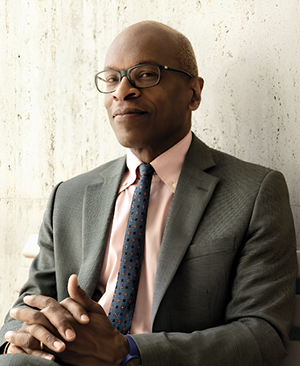
Richard H. Driehaus jury members have named Maurice Cox, a civic leader, urban planner and educator, the 2024 laureate of the Henry Hope Reed Award at the University of Notre Dame, to be celebrated on March 23 (Saturday) in Chicago.
The jury awarded this year’s prize in honor of Cox’s efforts to address social and economic inequity by means of well-informed policy and design, his contributions to education and the importance of preserving the social and built fabric of communities, and his remarkable commitment to public service.
“His expertise working across political appointments, leadership positions in education, private practice, and elected roles over the course of a long and varied career is an example of how civic engagement and attention to design can directly improve the lives of each and every member of a community,” said Stefanos Polyzoides, Driehaus Prize jury chair and the Francis and Kathleen Rooney Professor and Dean of Notre Dame’s School of Architecture.
Cox’s contributions to the built environment encompass a much larger sphere in the world of public service. As a member of the Charlottesville, Virginia, city council from 1996 to 2002 and as its mayor from 2002 to 2004, he demonstrated how one person can make a difference through knowledge, wisdom, collaboration and dedication to the common good.
“Throughout his career, Maurice Cox stressed strategies that provide access to housing and neighborhood services for all citizens through a mixed-use model of urban development and has worked consistently to make places more sustainable, resilient and livable,” the jury citation reads. “He has repeatedly put himself in places where the challenges seemed the greatest and has left behind solid foundations that others can build upon.”
During his mayoral term, Charlottesville was ranked as the “#1 Best Place to Live in the USA & Canada” by Frommer’s Cities Ranked and Rated. It was also the smallest city in America to maintain a AAA-bond rating for excellence in fiscal management with a municipal city budget of $100 million. Under his leadership, several large projects were completed, including the passage of an award-winning zoning ordinance in support of mixed-use, pedestrian-oriented development; new infill residential neighborhoods and mixed-income, higher-density housing; and a 2-mile, federally funded parkway entrance into the city.
Cox’s planning work continued beyond public service in Virginia. He went on from teaching at the University of Virginia to Tulane University, where he managed successful programs at the Tulane City Center, URBANbuild, the Tulane Regional Urban Design Center, the school’s preservation program and its Master of Sustainable Real Estate Development program.
The next stage in his career brought him first to Detroit and then to Chicago, cities where he directed the planning and development process with notable results. In Detroit, as director of planning, Cox infused new energy and talent into his department and began the process of neighborhood regeneration in one of the most disinvested places in America. In Chicago, as commissioner of planning and development, Cox led a campaign that included new solutions for affordable housing across the many underserved neighborhoods in the city, with high attention paid to community building and citizen engagement. His revitalization strategy attracted $1.2 billion in private investment to serve development that addressed greater equity and justice.
Cox, who studied architecture at Cooper Union in New York under the guidance of John Hejduk, is co-founder of the national Social, Economic, Environmental, Design (SEED) Network. He has served as design director of the National Endowment for the Arts (NEA) in Washington, D.C., led the Mayors’ Institute on City Design and the Governors’ Institute on Community Design, and oversaw the award of more than $2 million a year in NEA design grants across the United States.
This year’s laureate was selected by a jury composed of Melissa DelVecchio, partner at Robert A.M. Stern Architects; Michael Lykoudis, professor of architecture at the University of Notre Dame; Léon Krier, architect and urbanist; Elizabeth Plater-Zyberk, founding principal of DPZ CoDesign and professor at the University of Miami; Demetri Porphyrios, principal of Porphyrios Associates, London; and Julia Treese, partner at Treese Architekten in Berlin. Stefanos Polyzoides, Notre Dame architecture professor and dean, and partner in Moule & Polyzoides, Architects and Urbanists, Pasadena, California, served as jury chair.
The Henry Hope Reed award of $50,000 is granted by the Driehaus Trust, in the name of Richard H. Driehaus, founder and chairman of Chicago-based Driehaus Capital Management LLC.